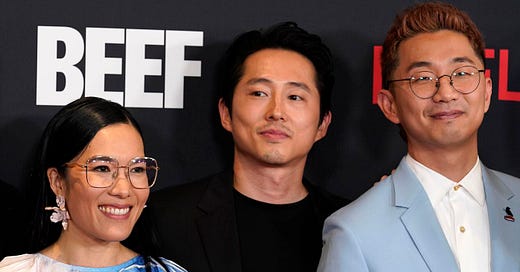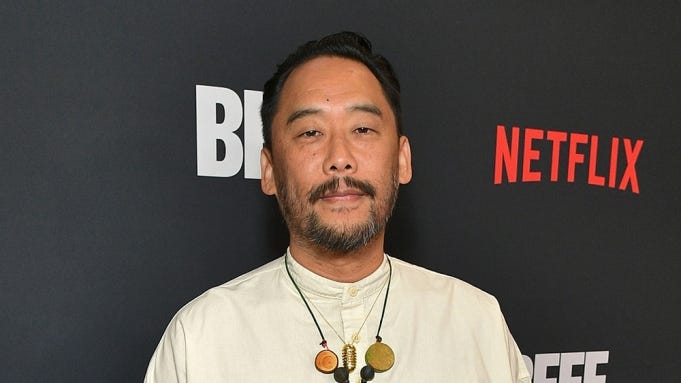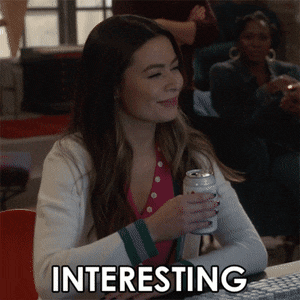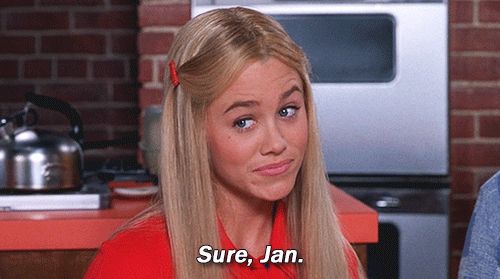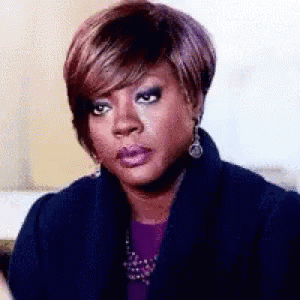A Publicist's Reaction to the BEEF Team's Statement
See my official dissection and grade
On Friday, Lee Sung Jin, Steven Yeun, and Ali Wong, the production team behind “BEEF” released a statement to Variety, attempting to take a neutral stance on the resurfaced clip from a podcast interview in which Choe described a sexual assault and called himself a “successful rapist.” He is now working to scrub the internet of the 9-year-old video.
“The story David Choe fabricated nine years ago is undeniably hurtful and extremely disturbing. We do not condone this story in any way, and we understand why this has been so upsetting and triggering. We’re aware David has apologized in the past for making up this horrific story, and we’ve seen him put in the work to get the mental health support he needed over the last decade to better himself and learn from his mistakes.”
The three sentences are concise, but pack a lot of punch and covert messages, attempting to both distance themself from the backlash and minimize the offense. This is quite an ambitious dichotomy to strive for and unsurprisingly, it falls flat.
I’m going to put my publicist cap on and dissect this statement.
First, it’s notable that it comes from Jin, Yeun, and Wong, A24 representatives remaining noticeably absent.
“The story David Choe fabricated nine years ago is undeniably hurtful and extremely disturbing.”
In the opening sentence, they pointedly refer to the disturbing clip as a “story…fabricated nine years ago.” By opening with this sentence, they are taking a clear position, insisting that not only did this take place in the past, but the story itself is bogus.
“We do not condone this story in any way, and we understand why this has been so upsetting and triggering.”
This is drawing inspiration from Taylor Swift’s infamous, “I’d very much like to be excluded from this narrative,” quip, essentially translating to: “This is fucked up, but it has nothing to do with us.” They are acknowledging how bad this looks but are insisting it is Jimmy Fallon in Blackface situation — a sign of the times, not a representation of someone’s character.
“We’re aware David has apologized in the past for making up this horrific story, and we’ve seen him put in the work to get the mental health support he needed over the last decade to better himself and learn from his mistakes.”
This is perhaps the most disappointing aspect of this statement. They employ the use of the word “horrific” alongside the much softer word “mistakes,” but only after they remind you that he has already apologized, and you should be over it by now.
There are several questions we, the readers, are left with following this statement, many of which have been posed explicitly online:
What evidence do you have that this story is “fabricated?”
What kind of “mental health support” has Choe sought?
You’ve indicated that you already knew about this debacle prior to hiring Choe — Why did it take so long for you to speak on it?
As I mentioned before, it is concise and packs a punch in only a few sentences. However, it fails to take a real stance either for or against Choe, and utilizes buzzwords to distract from the real context of the message. The trio, or rather their publicists, want you to distance them from the issue, but wants to keep your viewership by minimizing the incident itself. This statement is strategic in its word choice yet reckless in its attempt for neutrality.
After careful consideration, I give this statement a C+


